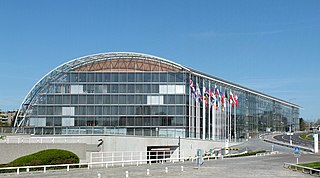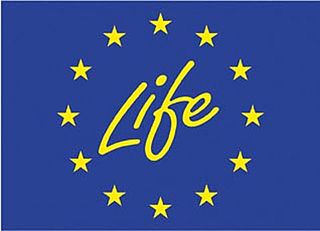Related Research Articles

The European Investment Bank (EIB) is the European Union's investment bank and is owned by the EU Member States. It is one of the largest supranational lenders in the world. The EIB is a not for profit organisation which funds projects that achieve the policy aims of the European Union through loans, guarantees and technical assistance.

Research and development, known in Europe as research and technological development (RTD), is the set of innovative activities undertaken by corporations or governments in developing new services or products and improving existing ones. Research and development constitutes the first stage of development of a potential new service or the production process.

A European political party, known formally as a political party at European level and informally as a Europarty, is a type of political party organisation operating transnationally in Europe and within the institutions of the European Union. They are regulated and funded by the European Union and are usually made up of national parties, not individuals. Europarties have the exclusive right to campaign during the European elections and express themselves within the European Parliament by their affiliated political groups and their MEPs. Europarties influence the decision-making process of the European Council through coordination meetings with their affiliated heads of state and government. They also work closely and co-ordinate with their affiliated members of the European Commission.

The European Structural and Investment Funds are financial tools set up to implement the regional policy of the European Union. They aim to reduce regional disparities in income, wealth and opportunities. Europe's poorer regions receive most of the support, but all European regions are eligible for funding under the policy's various funds and programmes. The current Regional Policy framework is set for a period of seven years, from 2021 to 2027.
The EU also funds educational, vocational and citizenship-building programmes which encourage EU citizens to take advantage of opportunities which the EU offers its citizens to live, study and work in other countries. The best known of these is the Erasmus programme, under which more than 3,000,000 students have taken part in inter-university exchange and mobility over the last 20 years. Since 2000, conscious of the importance of Education and Training for their economic and social objectives, EU Member States have begun working together to achieve specific goals in the field of Education. By sharing examples of good policy practice, by taking part in Peer Learning activities, by setting benchmarks and by tracking progress against key indicators, the 27 Member States aim to respond coherently to common challenges, whilst retaining their individual sovereignty in the field of Education policy. This strategy is referred to as the Education and Training 2020 programme (ET2020), which is an update of the Education and Training 2010 programme. The European Union is also a partner in various inter-governmental projects, including the Bologna Process whose purpose is to create a European higher education area by harmonising academic degree structures and standards as well as academic quality assurance standards throughout EU Member States and in other European countries.

The European Social Fund+ (ESF+), created by merging the existing European Social Fund with the EU Fund for European Aid to the Most Deprived (FEAD) and the EU Programme for Employment and Social Innovation (EaSI) in 2021, is the European Union's main financial instrument for supporting employment in the member states of the European Union as well as promoting economic and social cohesion. ESF+ spending amounts to around 10% of the EU's total budget.

Acciona, S.A. is a Spanish multinational conglomerate dedicated to the development and management of infrastructure and renewable energy. The company, via subsidiary Acciona Energy, produces 21 terawatt-hours of renewable electricity a year.

The Roaming Regulation (EU) 531/2012 with later amendments and implementing regulations, regulate the imposition of roaming charges within the European Economic Area (EEA), which consists of the member states of the European Union, Iceland, Liechtenstein and Norway. They regulate both the charges mobile network operator can impose on its subscribers for using telephone and data services outside of the network's member state, and the wholesale rates networks can charge each other to allow their subscribers access to each other's networks.

Although the European Union has legislated in the area of energy policy for many years, the concept of introducing a mandatory and comprehensive European Union energy policy was only approved at the meeting of the informal European Council on 27 October 2005 at Hampton Court. The EU Treaty of Lisbon of 2007 legally includes solidarity in matters of energy supply and changes to the energy policy within the EU. Prior to the Treaty of Lisbon, EU energy legislation has been based on the EU authority in the area of the common market and environment. However, in practice many policy competencies in relation to energy remain at national member state level, and progress in policy at European level requires voluntary cooperation by members states.

The Republic of Azerbaijan and the European Union (EU) have maintained a positive relationship through the years and have become more closely linked since 1991. Azerbaijan is currently part of the European Neighborhood Policy, the Eastern Partnership and the Council of Europe. The EU is the largest foreign grant donor and investor of Azerbaijan, both in the government sector and civil society making available over 600 million EURO of bilateral EU assistance since 1992.

The Southern Gas Corridor is an initiative of the European Commission for a natural gas supply route from Caspian and Middle Eastern regions to Europe, proposed in 2008. The goal of the Southern Gas Corridor is to reduce Europe's dependency on Russian gas and add diverse sources of energy supply. The route from Azerbaijan to Europe consist of the South Caucasus Pipeline, the Trans-Anatolian Pipeline, and the Trans-Adriatic Pipeline. The total investment of this route is estimated US$45 billion. The main supply source would be the Shah Deniz gas field, located in the Caspian Sea.

The LIFE programme is the European Union’s funding instrument for the environment and climate action. The general objective of LIFE is to contribute to the implementation, updating and development of EU environmental and climate policy and legislation by co-financing projects with European added value. LIFE began in 1992 and to date there have been five phases of the programme. During this period, LIFE has co-financed some 4600 projects across the EU, with a total contribution of approximately 6.5 billion Euros to the protection of the environment and of climate. For the next phase of the programme (2021-2027) the European Commission proposed to raise the budget to 5.45 billion Euro.
Rural development is a vitally important policy area in the European Union. It works to improve aspects of the economic, environmental and social situation of the EU's rural areas. Rural regions cover 57% of the EU territory and 24% of the EU population. Together with intermediate regions they comprise 91% of the EU territory and 59% of the total EU population. Across the EU, the dimensions of the rural-urban territorial vary – from countries with an explicitly defined rural character to Member States that tend to be more urbanised.
On 6 May 2015, the European Commission, led at the time by Jean-Claude Juncker, communicated the Digital Single Market Strategy which intend to remove virtual borders, boost digital connectivity, and make it easier for consumers to access cross-border online content. The Digital Single Market, which is one of the European Commission’s 10 political priorities, aims to fit the EU’s single market for the digital age – moving from 28 national digital markets to a single one and then to open up digital services to all citizens and strengthen business competitiveness in the digital economy. In other words, the Digital Single Market is a market characterized by ensuring the free movement of people, services and capital and allowing individuals and businesses to seamlessly access and engage in online activities irrespective of their nationality or place of residence. Fair competition conditions and a high level of protection of personal and consumer data are applied.
Events in the year 2014 in the European Union.

The European Commission's Asylum, Migration and Integration Fund is a funding programme managed by the Directorate-General for Migration and Home Affairs which promotes the efficient management of migration flows and the implementation, strengthening and development of a common approach to asylum and immigration in the European Union. All EU Member States except Denmark participate in the implementation of this Fund. Most of the funds are provided to the EU Member States for activities addressing previously agreed upon themes. A part of the funding is reserved for emergency assistance. A final part is reserved for Union Actions, which are European Commission managed projects that are developed as either calls for proposals, direct awards, procurements, or delegation agreements.
The Research Executive Agency (REA) is an executive agency established by the European Commission in order to manage specific Community activities in the field of research and innovation. The REA's mission is to assist the Commission in achieving the objectives of the Research Framework Programmes and the EU strategies to foster growth through research and innovation. The agency started operating in 2009.

The European Defence Fund (EDF) is a component of the European Union's (EU) Common Security and Defence Policy (CSDP) which aims to coordinate and increase national investment in defence research and improve interoperability between national armed forces. It was proposed in 2016 by Commission President Jean-Claude Juncker and established in 2017. The fund has two stands; Research and Development & Acquisition. In July 2018, the European Commission announced that the EDF budget for 2021-2027 would be €13 billion. This sum was later revised by the European Commission as part of the new EU budget proposed on May 27th 2020, as a result of the COVID-19 pandemic, according to which the EDF will be allocated €8 billion over this budget period.
Egnatia Railway is a planned railway line between Alexandroupolis and Igoumenitsa in northern Greece. The project is planned to include existing track upgrades as well as new track. The projected cost of this project is €10 billion.

The Capital Markets Union (CMU) is an economic policy initiative launched by the former president of the European Commission, Jean-Claude Junker in the initial exposition of his policy agenda on 15 July 2014. The main target was to create a single market for capital in the whole territory of the EU by the end of 2019. The reasoning behind the idea was to address the issue that corporate finance relies on debt and the fact that capitals markets in Europe were not sufficiently integrated so as to protect the EU and especially the Eurozone from future crisis. The Five Presidents Report of June 2015 proposed the CMU in order to complement the Banking union of the European Union and eventually finish the Economic and Monetary Union (EMU) project. The CMU is supposed to attract 2000 billion dollars more on the European capital markets, on the long-term.
References
- ↑ "What is the European Fund for Strategic Investments (EFSI)?". Eib.europa.eu. 2016-11-17. Retrieved 2017-01-16.
- ↑ "EUR-Lex - 32015R1017 - EN - EUR-Lex". Eur-lex.europa.eu. 2015-01-07. Retrieved 2017-01-16.
- ↑ "Investment Plan | European Commission". Ec.europa.eu. Retrieved 2017-01-16.
- ↑ Spiegel, Peter (26 November 2014). "Juncker defends launches funding method for €315bn infrastructure projects". Financial Times.
- ↑ "Juncker reveals giant EU investment plan - BBC News". BBC News. 26 November 2014. Retrieved 2017-01-16.
- ↑ "Making the EFSI a solution for investments in Europe –". Euractiv.com. 2014-06-20. Retrieved 2017-01-16.
- ↑ "EIB Group impact: Boosting GDP and jobs". EIB.org. Retrieved 2021-05-17.